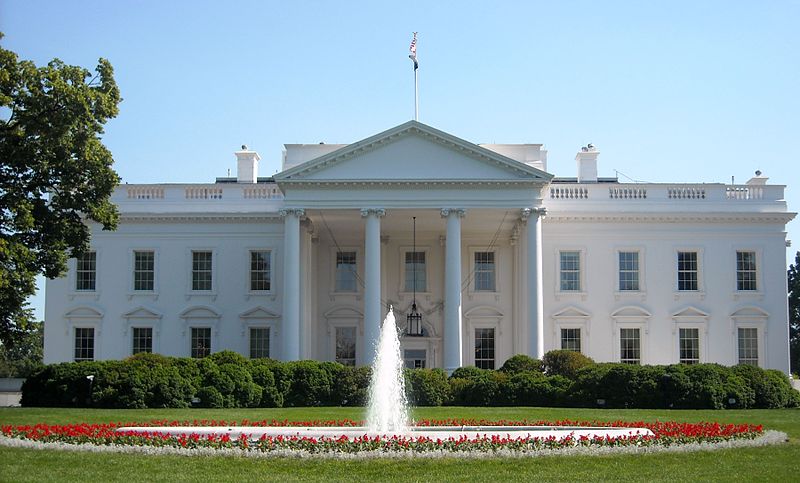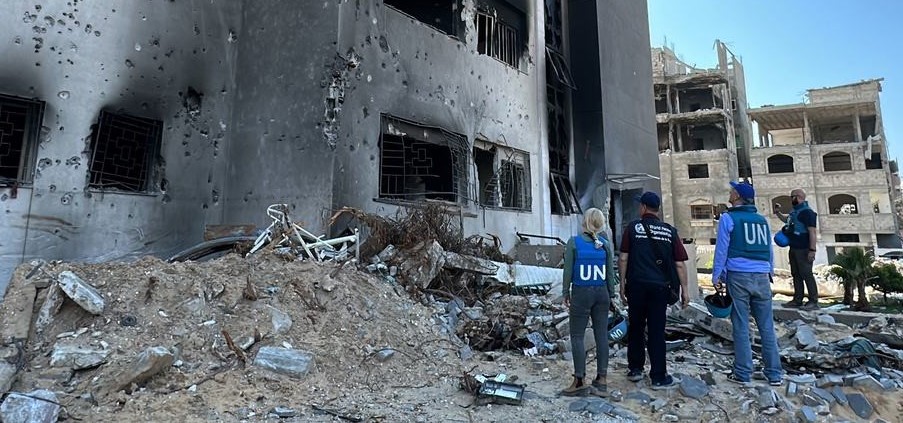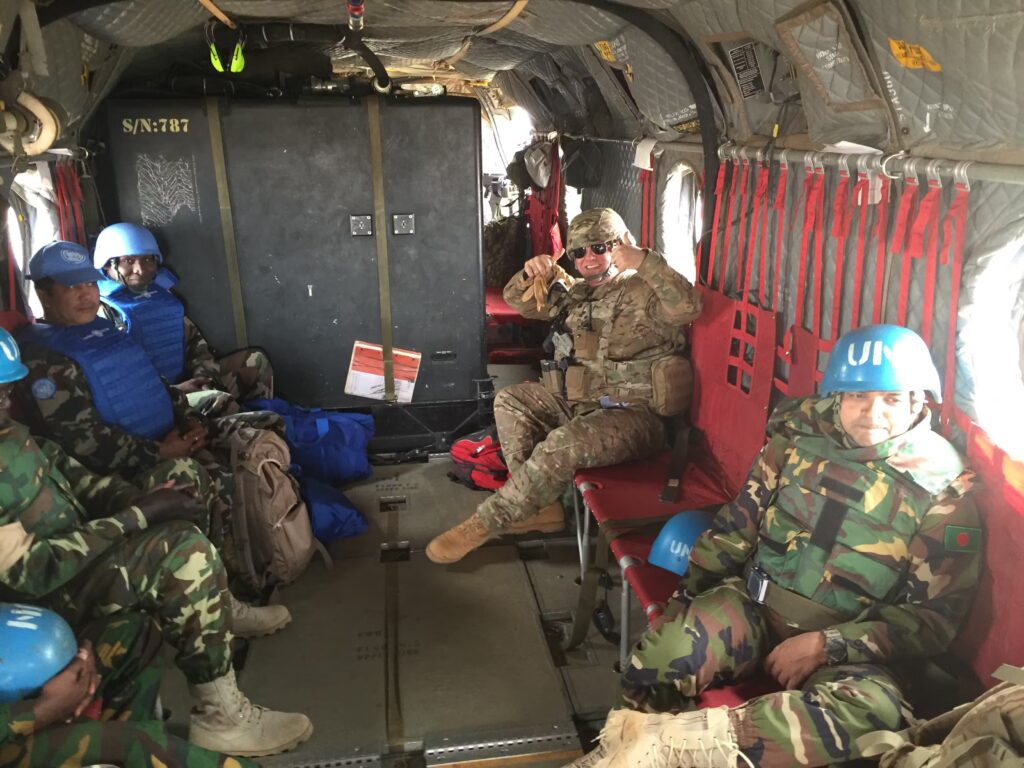On March 28, 2022, the White House released President Biden’s Fiscal Year 2023 budget request. With regards to the UN, the picture is mostly positive:
- The White House is requesting $1.658 billion for the Contributions for International Organizations (CIO) account, which funds U.S. dues payments to the UN regular budget and a number of other international organizations. This represents a slight cut ($4.7 million) from the FY’22 enacted level.
- The Administration requests funding to pay our peacekeeping assessments in full and pay back $730 million in arrears accrued since FY’17 as a result of the 25 percent cap.
- The Administration requests an increase in voluntary funding for the UN over FY’22 levels. Within the International Organizations and Programs (IO&P) account, some agencies, like UNFPA, would receive an increase over the final FY’22 appropriation, while most others would receive equal or slightly reduced levels of funding.
- The request includes $1.6 billion for the Green Climate Fund.
Provided below is a more detailed summary of specific accounts.
Contributions to International Organizations (CIO): $1,658,239,000
- The State Department’s CIO account funds U.S. dues payments to the UN regular budget (UNRB) and the assessed budgets of more than 40 UN specialized agencies and non-UN international organizations, including the International Atomic Energy Agency (IAEA), World Health Organization (WHO), NATO, and the OAS.
- The request includes a total of $1.658 billion for the account, just $4.7 million less than the amount appropriated in the FY’22 Omnibus. The overall amount includes $692 million for the UN regular budget ($5 million below the President’s FY22 request), $103 million for WHO ($20 million below the FY22 request), $111 million for the IAEA ($2 million below the FY’22 request), and $110 million for FAO ($1 million below the FY’22 request).
- The $20 million reduction in funding for WHO is due to a decreased assessment for the U.S. in the approved WHO budget for Calendar Year 2022 and 2023 (the U.S. rate went from $123 million to $109 million per year). The U.S. has an additional $6 million in credits from previous years to fully fund the WHO.
- Similar to last year’s request, the Biden Administration requests bill language to waive the statutory funding prohibition on the UN Education, Science and Cultural Organization (UNESCO) and other UN specialized agencies that admit Palestine as a member state: “The President may waive section 414 of Public Law 101–246 and section 410 of Public Law 103–236 on a case-by-case basis, if the President determines and certifies in writing to the Speaker of the House of Representatives, the President Pro Tempore of the Senate, and the Committees on Appropriations that to do so is important to the national interest of the United States.” In addition, the request for CIO includes $150 million to the equivalent of two-years’ worth of UNESCO dues, if the waiver language is enacted. The FY22 Omnibus included $75 million to pay one year of UNESCO dues, though it did not ultimately include waiver language.
Contributions for International Peacekeeping Activities (CIPA): $2,327,235,000
- The request includes $2.327 billion for CIPA, a State Department account that funds U.S. dues payments to most UN peacekeeping missions and the UN Mechanism for International Criminal Tribunals. U.S. assessments for the UN Support Office in Somalia (UNSOS)—an entity that provides logistical support and equipment to African Union forces operating in Somalia—are appropriated by Congress under the Peacekeeping Operations (PKO) account.
- The amount provided in the request is more than $828 million above the FY’22 Omnibus appropriations bill. This is enough to pay our estimated FY’23 peacekeeping assessments at the full assessed rate (26.94 percent) as well as to pay back $730.3 million in cap-related arrears accrued between FY’17 and FY’22. As you may recall, the FY22 Omnibus did not lift the cap (though it did provide sufficient funding to pay our FY’22 dues at the full assessed rate), nor did it provide funding to pay down our arrears, which currently total more than $1 billion. The Biden Administration’s FY’22 request allocated $300 million for arrears payments under CIPA, so the arrears total in the FY’23 request represents a significant increase over the previous total.
Peacekeeping Operations: $465,559,000
- PKO provides voluntary contributions to several regional peacekeeping initiatives and bilateral security assistance programs. Congress has also historically used the account to fund assessments for UNSOS, which provides logistical support and equipment to the African Union Mission in Somalia. The FY’22 Omnibus continued this practice, specifying that a portion of the account “may be made available to pay assessed expenses of international peacekeeping activities in Somalia under the same terms and conditions, as applicable, as funds appropriated by this Act under the heading ‘Contributions for International Peacekeeping Activities.’” In a break from prior years, the President’s budget includes funding for UNSOS under PKO as well.
- The Biden Administration’s request for the account is around $10.5 million above the enacted FY’22 level.
International Organizations and Programs (IO&P): $457,200,000
- The State Department’s IO&P account provides voluntary contributions to the core budgets of a range of UN entities focused on humanitarian, development, environmental, human rights, and gender equality issues, including the UN Children’s Fund (UNICEF), UN Development Programme (UNDP), UN Women, the UN Environment Programme (UNEP), UN Population Fund (UNFPA), and Office of the High Commissioner for Human Rights (OHCHR), among others.
- The President’s request of $457.2 million for the account represented an increase of $34.2 million over the amount provided in the FY’22 Omnibus Appropriations bill. This continues to represent a sea change from the Trump Administration, which consistently recommended eliminating funding for the account in its annual budget requests.
- The request did include increases for UNPFA ($56 million from $32.5 million in the FY’22 Omnibus) and the IPCC/UNFCC ($21 million from $15 million in the FY’22 Omnibus). The U.S. contribution to UNICEF ($135.5 million) is a slight increase over FY’22 because in previous years there was an addition of $5 million to UNICEF in the IO&P table for a contribution to the UNICEF-UNFPA Joint Program on Female Genital Mutilation. It is unclear if there is a direct contribution to the Joint Program in this budget request. The request also deleted many provisions related to UNFPA (dollar-for-dollar withholding, segregated accounts, and no funding of abortions), except for changes that were sought to clarify the Kemp-Kasten provision, which would make it more difficult for future administrations to deny funding to UNFPA because of their work in China,
- For additional details on how individual agencies and programs fared in this account, please see Table II below. Please note that this is not an exhaustive list of every entity funded by IO&P.
Migration and Refugee Assistance (MRA): $3,912,000,000
- The MRA account is a critical source of voluntary funding for several UN agencies focused on refugees and migrants: the UN Refugee Agency (UNHCR) and International Organization for Migration (IOM). Congress does not specify how much each agency receives from the account: rather, the actual apportionment of MRA funds to international organizations and NGOs is determined by the State Department.
- The total included for MRA comes in around $400 million below the total final FY’22 appropriation (including supplemental funding).
Global Health Programs – Discretionary Spending: $10,576,000,000
Overall, the FY’23 President’s Budget Request includes $10.576 billion for State and USAID global health programs, including $6.62 billion for global health programs at State Department, and $3.956 billion for global health programs at USAID. Cumulatively, these represent a $746 million in increase for global health programs over FY’22 levels.
Within this total, the FY’23 request includes $879.5 million for maternal and child health programs at USAID, a decrease of $11.5 million from enacted FY’22 levels.
- Gavi, the Vaccine Alliance: The FY’23 budget recommends $290 million for Gavi, the Vaccine alliance, the same as the public-private partnership’s FY’23 request. This is level funding from FY’22 enacted levels. It would mark the third year of the U.S. pledge of $1.16 billion from 2020-2023 to support Gavi that will immunize an additional 300 million children and save 7-8 million lives over the next five years.
- Reproductive Health and Family Planning: The FY’23 budget request recommends $597 million for bilateral reproductive health and family planning programs ($572 million through the Global Health Programs Account and $25 million through the Economic Support Funds account), a $22 million increase over FY’22 enacted levels. The budget request does not include language sought by many advocates in deleting the Helms Amendment (U.S. ability to fund abortions internationally) but did delete the Hyde amendment (funding for abortions domestically) which was supported by many pro-choice advocates.
- UNICEF: The FY’23 budget recommends $134 million for UNICEF base funding, level with base funding from FY’22 levels. This funding will help UNICEF continue essential work in promoting child health and survival, particularly through vaccination. In 2020, UNICEF delivered more than 65.9 million doses of vaccines to children in humanitarian emergencies across 15 countries against polio, measles, mumps, and rubella. UNICEF also helped governments vaccinate 66.3 million children in 64 priority countries against diphtheria, tetanus, and pertussis. In total, UNICEF procured 1.9 billion doses of vaccines for 102 countries and supplied vaccines to reach 45 percent of the world’s children under five.
- State Department and USAID Global Health Security: The FY’23 budget recommends $995 million for global health security, including $745 million for USAID core global health security activities, an increase of $45 million over FY’22 enacted levels, and $250 million for State global health security programs. USAID’s proposed funding would go towards building better preparedness for current and future health threats, including through the Global Health Security Strategy (GHSS) and the implementation of the Global Health Security Agenda (GHSA), to ensure that systems are in place to: prevent avoidable outbreaks; detect threats early; and respond rapidly and effectively when outbreaks occur.
- ACT-A: The overall $995 million proposed level also includes $250.0 million in funding through USAID for contributions to support multilateral initiatives leading the global COVID response through the Act-Accelerator platform. It also includes $250.0 million in GHP-State to support a new health security financing mechanism, being developed alongside U.S. partners and allies, to ensure global readiness to respond to the next outbreak.
- Within this funding, CDC also mentions how polio assets and infrastructure have historically helped tackle the emergence of health crises in several countries around the world, including the Ebola outbreak in Nigeria in 2014. For the current pandemic, CDC contributed 6,772 days of polio staff time to support COVID-19 response in the United States and in countries where CDC has a presence. For example, the Stop Transmission of Polio (STOP) team devoted much of its time in 2020 helping with COVID-19 response in almost 50 countries.
- Regarding CDC measles activities in FY’23, the President’s Budget highlights resumption of mass measles vaccine campaigns, including vaccine purchase for those countries with the highest disease burden. CDC will strengthen the collection and use of surveillance data to better guide program strategy and implementation for measles and rubella elimination. Finally, CDC will continue capacity building with countries experiencing the highest burden of VPDs to promote the sustainability of their immunization programs and surveillance systems.
- CDC Polio and Measles: The President’s FY’23 budget recommends $176 million for polio eradication, a decrease of $2 million below FY’22 enacted levels, and $50 million for measles and rubella elimination and control activities, level funding from FY’22 levels. Using polio funding, in FY’23 CDC will focus activities on recovering from the cessation of polio campaigns due to the COVID-19 pandemic, prioritize polio eradication activities to stop circulation of wild polio virus in Afghanistan and Pakistan, and focus on ending ongoing vaccine-derived poliovirus outbreaks primarily across Africa. Additionally, CDC will work to improve disease surveillance capabilities in endemic, outbreak, and high-risk areas through quality assurance, diagnostic confirmation, and genomic sequencing of samples obtained worldwide.
- CDC Global Health Security: The FY’23 draft provides CDC core global health security programming with $353.2 million, a $100 million increase over FY’22 final levels. This funding would: help modernize and expand frontline disease detective training and enhance emergency response capabilities in partner countries and regions; provide expertise and interventions aimed at saving lives and reducing cholera and other illnesses by improving global access to healthy and safe water and adequate sanitation; accelerate development of national and regional public health institutes; and provide expertise in port-of-entry surveillance, preparedness, and travel medicine. In addition, CDC will utilize this funding to establish two new regional offices and expand the technical expertise located in the existing regional offices.
- Global Fund: The President’s Budget Request for FY’23 includes a significant increase for the Seventh Replenishment of the Global Fund to Fight AIDS, Tuberculosis, and Malaria to $2 billion per cycle year. This pledge is consistent with the investment case released by the Global Fund in February 2022 and continues the two to one funding structure provided by the United States. A fully replenished fund of $18 billion would save an additional 20 million lives, reduce deaths from malaria, AIDS, and TB by 65 percent, and continue investments in building health system capacity in partner nations. The U.S. is slated to play host to the Seventh Replenishment of the Global Fund later this year.
- President’s Malaria Initiative: The President’s Budget Request provides a modest increase for the President’s Malaria Initiative (PMI), of $5 million above FY’22 levels to $780 million. Through the scaling up of proven malaria interventions, PMI works hand-in-glove with national malaria control programs in host countries to press toward elimination in up to 24 countries in sub-Saharan Africa, three country programs in the Greater Mekong Subregion of Southeast Asia, and in Latin America. Increasing program funds seek to allow PMI to continue previous successes through rapid scaling up of malaria interventions, while combating drug and insecticide resistance. Further increases would also allow PMI to respond to disruptions caused by the COVID-19 pandemic, to hire, train, and equip additional community health workers, and continue removing fevers from overburdened health systems within program countries.
Global Health Programs – Mandatory Spending: $6,500,000,000 (State/USAID)
In addition to discretionary spending, the President’s Budget also includes a new mandatory account totaling $6.5 billion in Global Health Programs at State and USAID. The funding would be available over five years to make transformative investments in global health security and pandemic and other biological threat preparedness in support of national biodefense and pandemic preparedness goals. This funding would strengthen the global health workforce, advance research and development capacity, and increase health security financing to help prevent, detect, and respond to future COVID variants and other biological threats. This new fund includes:
- State Department – Global Health Security and Pandemic Preparedness Fund: The budget requests $4.5 billion for State as a contribution to help generate international support around the establishment of new financial intermediary fund (FIF) focused on global health security, and pandemic preparedness and response. This fund would be housed at the World Bank, with support and coordination from the World Health Organization, and would provide funding to address key gaps in the health security architecture to bolster pandemic preparedness including preparedness for future COVID variants at country, regional, and global levels. The creation of a new financial intermediary fund would recognize the urgent need to increase sustainable financing for pandemic preparedness and global health security. The FIF would support reducing the significant gaps that remain in disease surveillance, country level capability required by the International Health Regulations (2005) (IHR), as well as improving capacity to rapidly develop, manufacture, and administer countermeasures globally.
- State Department – Coalition for Epidemic Preparedness Innovations (CEPI) Funding: The FY’23 request includes $500 million over five years for a contribution for CEPI, to support vaccine research, development, and delivery, and to develop and deploy innovative tools to build resilience for future epidemics and pandemics.
- State Department and USAID – Health Worker Initiative (HWI): The FY’23 request includes $250 million for State and $750 million for USAID to build and strengthen the global health workforce as part of the Administration’s newly launching Health Worker Initiative (HWI), a component of both the Build Back Better World Initiative and the COVID-19 Response Plan.
- USAID – Emergency Reserve Fund (ERF): The budget requests $500 million for FY’23 to replenish the Emergency Reserve Fund to ensure USAID has the ability to quickly and effectively respond to infectious disease outbreaks. In the past, the ERF has enabled USAID to quickly respond in past infectious disease outbreaks, including Ebola, Pneumonic Plague, and COVID-19 outbreaks.
Global Health Programs – Mandatory Spending: $1,150,000,000 (CDC)
In addition to discretionary spending, the President’s Budget also includes a new mandatory account totaling $1.15 billion in global health security for CDC to support global disease detection and emergency response. This proposed mandatory funding would strengthen country partnerships while supporting global innovations to modernize public health data that can provide public health intelligence and improve the backbone of disease surveillance programs. Specifically, the funding would help expand and enhance multi-pathogen and molecular laboratory capabilities, as well as data modernization to detect and monitor respiratory and other high-consequence pathogens. In addition, the funding would help CDC and partner countries to integrate and modernize bioinformatics systems for web-based reporting, data repositories, and novel frameworks to improve information transfer, visualization, and analysis and strengthen multinational data systems to detect, characterize and communicate rare events and expand surveillance.




